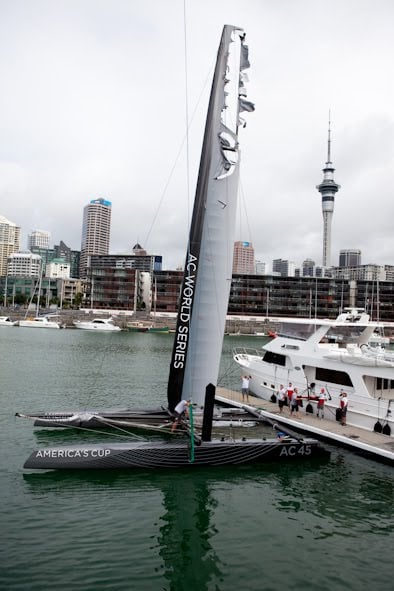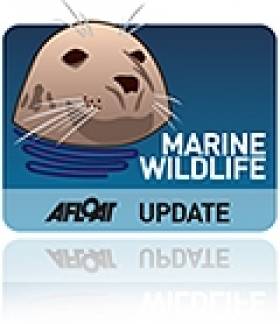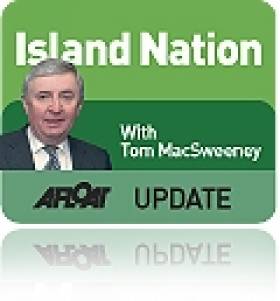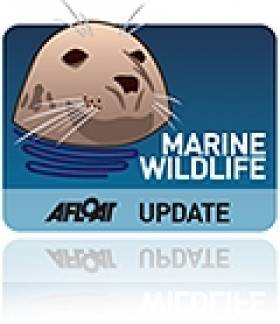Displaying items by tag: Whale
Sperm Whale Dies on Dungarvan Beach
A sperm whale that beached on a sand spit in Dungarvan, Co Waterford on Friday has died.
The male whale had been spotted off the coast in the 24 hours before it was discovered 'live stranded' on Cunnigar Strand.
Rescuers said there was "no effective way" of refloating the 10+ metre long whale from what became its final resting place.
"Once they come this far inshore they are pretty much doomed," the Irish Whale and Dolphin Group's (IWDG) Pádraig Whooley told the Irish Examiner.
No decision has yet been made regarding disposal of the whale carcass, but Irish Weather Online quotes Whooley as saying it is "a wasted opportunity when these magnificent specimens are simply hauled off for incineration".
Marine Department Promised, First America's Cup Capsize, Whales and Sailing Oil Tankers
I am reflecting this week on a varied list of maritime issues which have arisen in my writings on marine topics.
Following recent pieces I wrote about the attitude of political parties in the General Election towards the marine sector, I had a telephone call from a senior Fine Gael politician and, lo and behold, the party included the marine sector in its manifesto, pledging to restore the Department of the Marine, abolished by Fianna Fail. I await post-election developments with interest.
It has been a good week for those interested in protection of whales and dolphins. Hundreds of dolphins were spotted off the Old Head of Kinsale, apparently following shoals of herring and sprat on which they were feeding.
In the Antarctic the Japanese whaling fleet was forced to give in to pressure to stop culling. The Japanese have killed hundreds of whales every year, claiming this was for "scientific purposes," even though it has been identified worldwide as for human consumption. The fleet was ordered home by its Government after increasing international pressure.
The Irish Whale and Dolphin Group published its annual report this week. It was formed in December 1990, dedicated to the "conservation and better understanding" of cetaceans - whales, dolphins and porpoise - in Irish waters through "study, education and interpretation." IWDG turnover in 2010 was around €300,000. It has dealt with up to 10,000 queries a month for information on its website. A total of 92 strandings of 128 individual cetaceans was reported to the IWDG in 2010. This compares to 137 strandings of 169 animals for 2009.
This week oil prices rose because of the unrest in Libya and David Surplus, Chairman of B9 Energy Britain's largest windfarm operator, warned that sooner or later oil will run out. BP is examining the possibility of building a fleet of carbon-neutral, wind-powered sail ships planned, to carry world trade.
On the international sailing scene the new AC 45, forerunner of the next generation of America's Cup boats was launched in New Zealand and had its first capsize. The wing-sailed catamaran is designed for speed and close racing, capable of making up to 30 knots, while intended to be handled in tight, tactical courses. An exciting boat to sail, it will also be very testing of ability. The first capsize of the new boat occurred on Auckland's Hauraki Gulf, hit by what was described as "a freak gust of wind," while the crew were doing maintenance on board before a sailing test.

Back in dock after the capsize
It capsized fully, ending upside down. Three support vessels were needed to pick up the crew and right the boat which was sailed back to its base in Auckland. There was damage to the wing sail, but no injuries to the crew. However, helmets may be an additional precaution needed for sailing these boats, which are to be used in the AC World Series! This will be a circuit of eight regattas for which venue bids are being made at present, with fleet and match racing, to raise the profile of high-performance sailing on worldwide television. Racing is to start in July, with regattas running until May of next year, leading into preparations for the next full AC series in the bigger AC72 catamarans in 2013 in San Francisco.
As the past week showed, there is always something interesting in the sea.
This article is reprinted by permission of the EVENING ECHO newspaper, Cork, where Tom MacSweeney writes maritime columns twice weekly. Evening Echo website: www.eecho.ie
Kenmare Locals Fail to Save Stranded Whale
Kenmare is no stranger to animal wildlife but rescuers were sadly unable to save an 18ft juvenile minke whale found stranded at Blackwater Pier, near Kenmare, Co Kerry last Friday.
The Irish Independent reports that despite the best efforts of local people and the National Parks and Wildlife Service (NPWS) to refloat the whale, the call was made to put it to sleep.
"It was so long out of the water it was pointless to try to refloat it as its internal organs would have been damaged," said local ranger Michael O'Sullivan.
The tragedy - the latest in an increasing number of strandings in the UK and Ireland - brought out more than 100 local residents to pay their respects at Blackwater Pier, a popular fishing spot.
Post Mortem on Mass Pilot Whale Strandings Cancelled Due to Bad Weather
Plans to carry out a post-mortem examinations on thirty-five Pilot whales found dead on a beach in Co Donegal yesterday have been cancelled due to bad weather according to Dr. Simon Berrow of the Irish Whale and Dolphin Group (IWDG).
Up to thirty-five Pilot whales were found dead on a beach in Co Donegal. The whales were discovered on Rutland Island near Burton port yesterday afternoon on a beach and have been confirmed as pilot whales, mostly mothers and calves.
A team from the Galway-Mayo Institute of Technology led by Dr Ian O'Connor and the Irish Whale and Dolphin Group are planning to travel to record length, gender and obtain photographs to see if they can be matched to the recently observed Scottish animals. Skin samples and teeth will also be collected for genetics and life-history studies.
According to locals the whales had been seen feeding in the area around Aranmore Island since Tuesday.
A group of around 30 pilot whales were monitored in South Uist in the outer Hebrides, Scotland last weekend for fear of their live-stranding. The IWDG believe it may be the same group.
Pilot whales have a tendency to strand themselves in large numbers and a similar incident occurred in Co Mayo a few years ago. In June Cape Verde islanders abandoned hope for the survival of 92 pilot whales that were found washed up in a mass beaching. In September in New Zealand at least 25 pilot whales died after beaching themselves in a north Wellington bay as rescuers battled to save almost 50 more stranded.
RTE News has pictures HERE































































